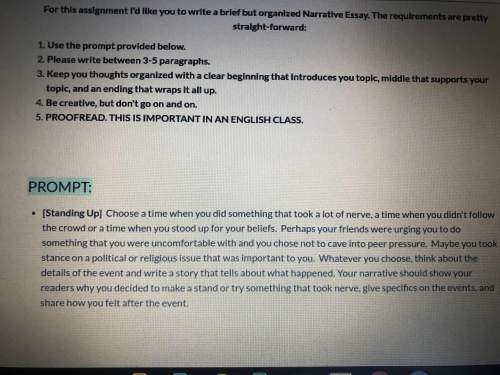
Which of the following assertions best applies to this excerpt?
A.
People are too preoccupied with getting into heaven, so they waste their money on religious endeavors.
B.
People no longer understand and appreciate the proper value of money.
C.
Society has lost all respect for the arts, replacing creative pursuits with monetary ones.
D.
Society must return to working closely with the earth and in nature in order to be happy.
E.
People have become lazy and unethical in pursuit of business.
from Life Without Principle
by Henry David Thoreau

Answers: 3
Other questions on the subject: English

English, 22.06.2019 04:20, Science2019
For the module essay you will write four paragraphs. • in paragraph 1, state one theme a reader can find in twelfth night and explain why it is good advice for the characters in the story • in paragraph 2, describe an event in the play, and explain how one of the characters' actions illustrates the theme • in paragraph 3. describe another event in the play, and explain how one of the characters' actions illustrates the theme • in paragraph 4. restate the theme, and explain why it is good advice for the reader and ons and you may write about either of the following themes (choose only one) • true love with a little from fortune triumphs over man's folly • troubles come and go don't take things too seriously
Answers: 2

English, 22.06.2019 05:30, mcouil9369
What is the main idea of this paragraph from the volcanoes section of the ready. gov website
Answers: 1

English, 22.06.2019 07:00, skylarleannjone2751
In this excerpt , mr. stonecrop is compared to a mountain. how does this description relates to mr. stoncrops roll in the main conflict of the story
Answers: 1

English, 22.06.2019 10:00, fespinoza019
Ineed . read this textbook passage. select the five (5) statements which are most logically supported by the given information. what would you do if you won ten million dollars in a lottery? your first reaction might be, “i’d spend the rest of my life on the beach (or skiing or traveling).” but in all likelihood you, like most other people who receive financial windfalls, would seek some kind of work eventually. a variety of motives keeps people working, even when they don’t need a paycheck to survive. if you’ve ever worked as a volunteer, you know that someone can be more satisfying than receiving pay. work also provides a sense of identity. one man aged 81 said, “i’ve been in the fabric business since i was a kid, and i still get a kick out of it." studies suggest that rats, pigeons, and children sometimes work to gain rewards, even if they can get the same rewards without working. one researcher wrote the following on the subject: rats will run down an alley tripping over hundreds of food pellets to obtain a single, identical pellet in the goal box, . . and pigeons will peck a key . . to get exactly the same food that is freely available in a nearby cup. given the choice of receiving marbles merely by waiting a certain amount of time for their delivery, children tend to prefer to press a lever . . to get the same marbles. 1. serving a purpose is satisfying. 2. it is not so lucky to win a large amount of money in a lottery. 3. endless “vacationing” eventually becomes dissatisfying. 4. the pay we receive is unimportant. 5. most people try to work as little as possible. 6. people, rats, and pigeons enjoy the challenges and interaction that work offers. 7. it generally feels better to achieve something than to be given something. 8. people who don’t retire continue to work only because they need the money. 9. most people who work as volunteers resent the fact that they are not paid for their work. 10. work can be its own reward.
Answers: 1
Do you know the correct answer?
Which of the following assertions best applies to this excerpt?
A.
People are too preoccupie...
People are too preoccupie...
Questions in other subjects:

Social Studies, 20.05.2020 19:02

Biology, 20.05.2020 19:02


English, 20.05.2020 19:02

Mathematics, 20.05.2020 19:02


Mathematics, 20.05.2020 19:02



Mathematics, 20.05.2020 19:02







